By CHLOE HARALAMBOUS
On 18 September, a group of Greek “patriots” congregated in the main square by the harbour of the Aegean island of Lesvos. Summoned by cadres of the neo-Nazi party, Golden Dawn, they had appeared to offer their protection to the Greek flag as it was hoisted by a parade of sullen military conscripts following rumours that the previous week’s procession had been intercepted and obstructed by a demonstration of belligerent migrants. As they stood on ceremony, a small group of anarchists who had caught wind of the plan appeared on the other side of the road to counter-demonstrate. The police force wheeled itself out in riot gear and formed a line between the two. As the parade performed the requisite ceremonials, the “patriots” broke out into the national anthem peppered with refrains of “Greece for Christian Greeks”, some with hands on their hearts, others with palms raised in Nazi salute. On the other side of the police line, the comparatively meagre gathering of anarchists chanted, “Fascists, boneheads, we’ll take you to the gallows”. Meanwhile, a number of migrants who had chanced to be sitting in the square watched, reasonably perplexed but nevertheless sensing in the solemnity of the “patriots” that some ceremonial tribute was being paid to the country “hosting” them. Recognising this, they stood in respect, some attempting to defuse the awkwardness of their position by proffering the peace sign to both camps.
Since the implementation of the 19 March EU-Turkey deal, Greece has ceased to be a country of transit for migrants arriving on its shores. For months, authorities were content to usher them along the length of the country to the Macedonian border, handing them over to neighbouring nations of the Balkan trail who in like manner shuttled them further and further north from border to border into countries of greater appeal such as Germany and Sweden. In February 2016, the rumour that Austria planned to shut its borders threatened to compromise the relay system, sending the Balkan route into a panic; each country in turn snapped its southern borders shut in a domino effect that left Greece the last tile standing, unable or unwilling to turn migrants back at the sea border. Over 60,000 migrants who had not made it to the northern border in time were left stranded on the mainland, where the majority remains to date. Having arrived before the EU-Turkey deal, they were automatically deemed refugees entitled to protection and cannot be deported or detained. Instead, they are “hosted”, unseen, in state-run facilities based in derelict factories or warehouses scattered around deserted industrial areas throughout Greece.
The EU-Turkey deal signalled a reactivation of the Dublin protocols, which stipulate that migrants must seek asylum only in their country of entry to the EU. Given that almost all migrants enter the EU through southern Europe, the measure ensures that the migrant population is contained in poorer countries left to shoulder the administrative, juridical, infrastructural and moral burden of managing the influx: from reception to processing, to the unpleasant business of deportation. Those arriving on the Greek islands after the deal are subject to arrest and detention. Following the twenty-five-day limit on administrative detention, people are given the right of limited freedom on the island, pending the outcome of their asylum application which – given the scarcity of resources and personnel, the lack of support from other EU member states and the overwhelming numbers arriving – often takes six months or more. During this period, people live in squalid conditions in the state-run facilities of Moria and Kara Tepe, with limited or no access to sanitary facilities, psychosocial and medical support or legal aid. The EU’s policies induce exhaustion, boredom, frustration and uncertainty. Facing neglect and under threat of deportation to Turkey, people despair.
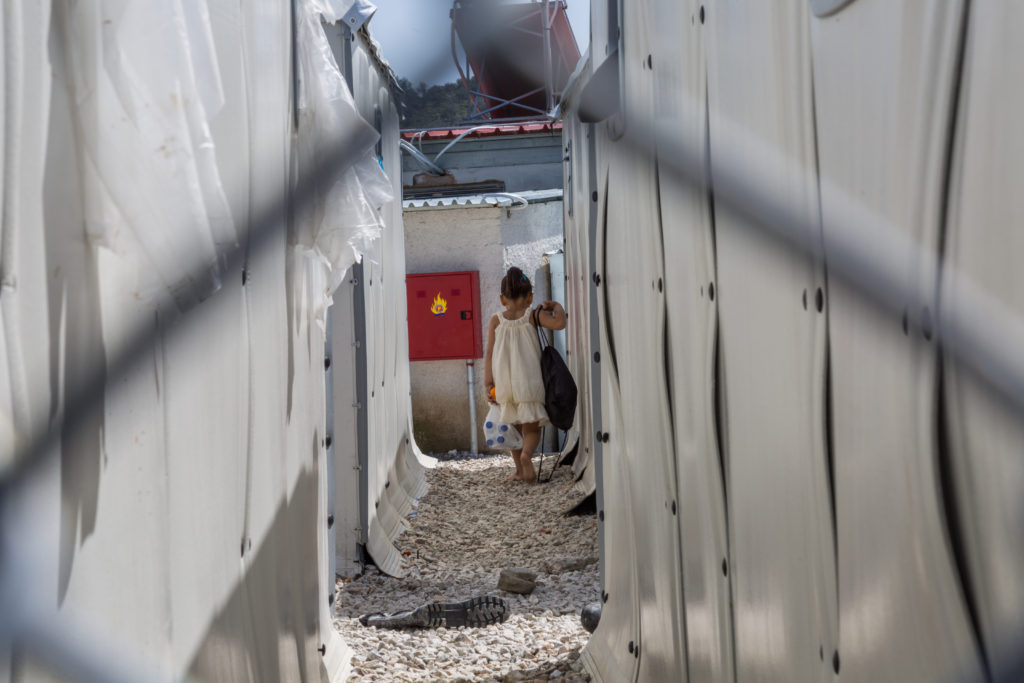
Such is the fate of the “others”. What of the Europeans? In Lesvos, their patience has reached the point of exhaustion after over a year of the island’s use as a battlefield for the confrontation between EU policy and the migrant influx. Recognising the semi-permanence of the migrant population, some now begin to craft their counter-assault. Golden Dawn stands ready to join its sister parties across Europe in a surge of popularity. Faced with this nationalist uprising in their own countries, European leaders once deemed “progressive” on the migrant question have been unable or unwilling to hold their ground. Today, they backtrack on promises to conjure a “Europe with a friendly face” (in Merkel’s words). The EU-Turkey deal inaugurated a new era in the European treatment of the “refugee crisis” and issued a clear mandate: “deflect” boats at the border, or deport them if they reach Europe.
Far from merely signalling its irrelevance, this new nationalism and the turn in European leadership place grave demands on the radical Left. Now that the “Merkelian” imaginary of a benevolent Europe is withering on the vine, the need for a critical Left alternative becomes pressing. Urgently, we need different ways of reckoning with the significance of the migrant subject in Europe. An adequate response has not been forthcoming. If liberal Europe became briefly enamoured with the language of humanitarian sympathy in the summer of 2015, the Left has only clung to that rhetoric while others moved on into more noxious terrain. Much of the Left has taken a back seat to liberal humanitarianism, mimicking humanitarian tropes, central among them the privileged category “refugee”, a category that prospers by its elevation above the despised “economic migrant”. In permitting distinctions between the deserving and undeserving migrant, it is a category that functions to outsource the limits of our compassion to the juridical and administrative mechanisms of the state.
I.
Last spring in Lesvos, the limits of humanitarianism became clearer by the day. A few days after the EU-Turkey agreement was signed, the Hellenic Coast Guard (HCG) announced that the first inaugural deportation of “economic migrants” would take place at 10 a.m., 4 April. Suspecting the authorities would take every precaution to avoid having to deal with the response of solidarity activists, we decided to play it safe and scheduled a protest for 6 a.m. At that time, there were over 1,000 Northern European and American volunteers on the island, on call for a boat landing at all hours and ready to stampede to the shore armed with various life-saving accoutrements to the “rescue” of the “sobbing” and “desperate” refugee mothers and babies. Confident these volunteers would raise hell at the deportation of people with whom just a few days earlier they had had their much-celebrated “quintessentially human moment” (the subject of many an impassioned Facebook post), we called them.
At six a.m., a yawning dribble of us staggered to the harbour, dragging our frayed “no human is illegal” banners behind us. An impressive array of news trucks stood parked at the edge of the water, journalists leaning against them busy with their coffee and pastries and packing up their last pieces of equipment. We hesitated, disoriented. Someone behind me muttered that the Jale, a tourist ferry repurposed for deportations was missing. We scanned the harbour for it and then turned to the open sea, only to see a faint plume of spray as the back of the Jale receded on the horizon, already in Turkish waters. Suspecting a demonstration in the making, the HCG had rounded up the deportees in the Moria Detention Center in the dead of night and loaded them onto buses en route to the port, each handcuffed to a gloved Frontex officer in a surgical mask whose purpose it was to drag the migrants onto the boat and ensure they stayed there all the way to Dikili, Turkey. Had they known we were capable of garnering numbers only in the low dozens, they might have saved themselves the trouble. A few protesters decided to unfurl their banners anyway and delivered a five-minute performance of, “No borders! No nations!” in front of cameramen willing to indulge them. And then everybody went home.
This was spring, and new in Lesvos. Winter had carried images of bad landings to a world pregnant with humanitarian impulses: clips of wet, shocked men and women shivering across a small village harbour wrapped in the tin foil space gear of dubious function known as the “emergency blanket”, sometimes crying, sometimes clasped in the arms of a beautiful Spanish lifeguard. Europe is chivalric as it meets miserable victims, this imagery says. What is left out is the jubilation that accompanies a boat touching land; people’s cheering, their prayers, their eagerness to shake hands, a man shrugging as he notices that his best suit, which he has worn for his entry into Europe, has been soaked through with sea water and muddied. You almost want to look away, embarrassed in the face of a hope in the image of a benevolent Europe – “The European Dream” – so dogged and so cherished, the kind of hope so fierce it will make a woman put her children in the hull of a rotting, leaking boat without it ever occurring to her that it might not be worth it.
To witness a deportation is to witness the impunity with which this hope is taken away– the absolute and impersonal violence with which the thing that drives people to risk to the point of seeming madness in the full, incorruptible confidence that they will be rewarded with a liveable life is finally and incontrovertibly denied. The deportation makes a mockery of all this, a mockery so cruel it makes a grown man shriek. Even a “voluntary returnee”, one who has succumbed to the EU’s policy of attrition and exhaustion, tugs desperately at the handcuffs that join her to the official dragging her up the ramp onto the deportation ferry.
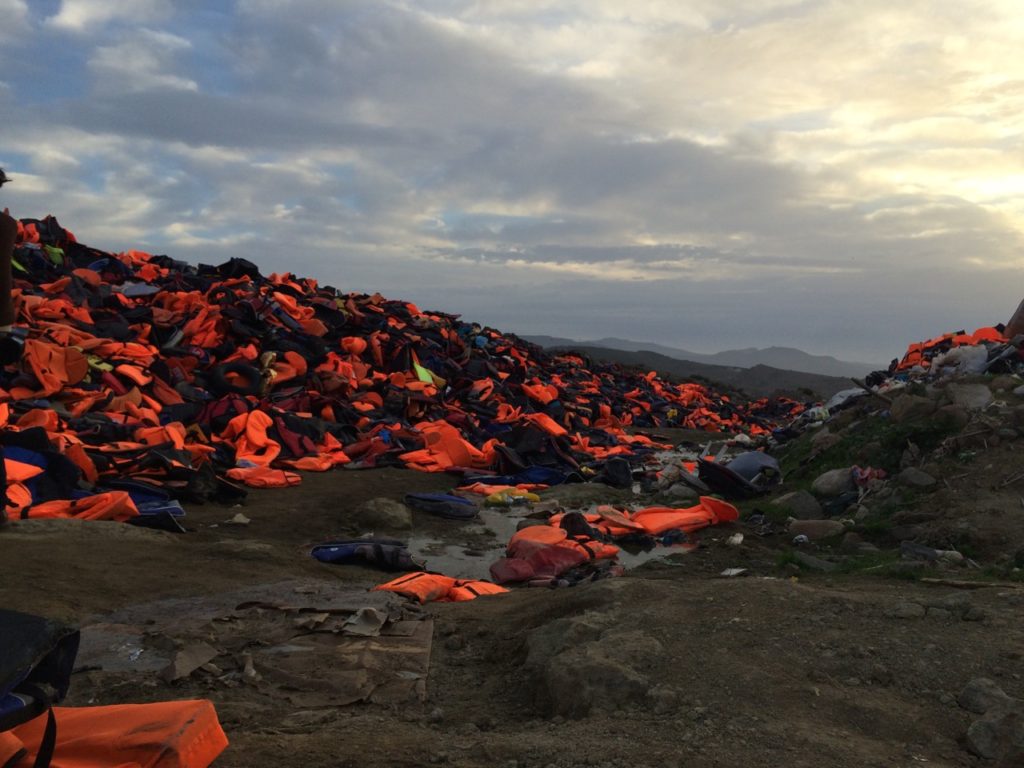
The mediatized landing conveys the friendly face of European values enacted, the heroic ventures of the white international in the face of the suffering brown body. The deportation, in contrast, is an unsavoury business of little glory. More to the point, perhaps, for volunteers and staff at most of the biggest NGOs on Lesvos the deportation is political, it signals the intervention of the state, and the introjection of a language quite distinct from the discourse of human compassion for those “wailing” on the shore. It is a subtler language, a discriminating language that carves out those whose wailing matters, and it arrives only after the NGOs have done their work of welcoming. These deportees were not the same people as those who had arrived to be “rescued” only a few days earlier. To be deported, they had to be redefined.
A boat arriving on the Greek shores contains neither refugees nor economic migrants. The terms “refugee” and “economic migrant” do not describe a set of experiences but a collection of rights to which only the former has access. A “refugee” only becomes a “refugee” when an asylum-granting nation-state attaches select rights to a person, recognizing them. The refugee does not precede this act of recognition, but the ideological power of these categories lies in their ability to present themselves as self-evident, as descriptive rather than generative: the contention is that some arrive refugees and some economic migrants. The ruse glosses over the material interests that determine the distinction and that make it fluid.
In the summer of 2015, the category “refugee” became the poster child of liberal Europe, more dangerously so than has often been appreciated. Touting the refugee as Europe’s worthy beneficiary became the crucial enabler allowing the EU to justify its “deflection” and deportation of “economic migrants” or “asylum-scroungers”, who could be depicted as opportunistically riding the wave of influx, necessitating the border’s adoption of heightened measures of surveillance, vigilance and punishment in order to keep out the unworthy travellers. That “real refugees” are also made to suffer the violence of these measures can be thus excused as unfortunate but necessary collateral. Their own resentment, this logic suggests, is best directed at would-be “economic migrants”, co-travellers lusting after rights that are not theirs to claim. Inter-ethnic fights in the refugee camps on Lesvos are frequently the result of one ethnicity asserting itself as “more refugee” than the other. The “refugee” and the “economic migrant” were and are pitted against each other, rhetorically and materially; the salvation of the one is predicated on the denial of the other. As the EU showcased its civilised munificence in accepting refugees, the criteria for who would be made to “count” as a refugee and thus who would be “saved” became increasingly narrow.
Since “the summer of migration”, the refugee category has undergone significant pruning. In February 2016, after months of waving all Iraqis, Afghans, Syrians and the occasional Iranian through, Macedonian border officials at Idomeni announced they would no longer be admitting Afghans; Afghans were from that point on no longer to be considered refugees. The same announcement regarding Iraqis followed shortly after. Meanwhile, the signature of the EU-Turkey deal mandated that all those arriving on Greek shores after 21 March would no longer be treated as refugees but be detained on the islands indefinitely, awaiting deportation barring a (rare) favourable outcome to their asylum application. A single day marked the difference between the migrant who was let through onto the Greek mainland under nominal “protection” and her friends –henceforth “illegals” – who made the crossing just a little later.
The 140 Pakistani men deported on 4 April were therefore not the same people as those who had arrived on the shores only a few days earlier. From the beach where a volunteer platoon had embraced them with fanfare, they had been escorted to the Moria “Reception and Identification Center” where, over the course of a few days, the authorities “processed” them, filtering them through the ordering framework that distinguished the refugee from the immigrant, the “authentic” desperate from the scrounging desperado before the system spit them out and they had emerged as new men: “economic migrants”.
At the root of the shame and frustration many of us experienced that morning at the harbour was not only our failure to fulfil even the most basic requirement of solidarity: to “show up” and to “see” them, but our numbers: the fact that there were so devastatingly few of us. In failing to “show”, our renegade “comrades” had pledged their allegiance to the ordering principle that determined these men were immigrants destined for deportation, and had agreed to allot their solidarity accordingly. Rarely does the state find such consenting allies among those claiming solidarity with the oppressed.
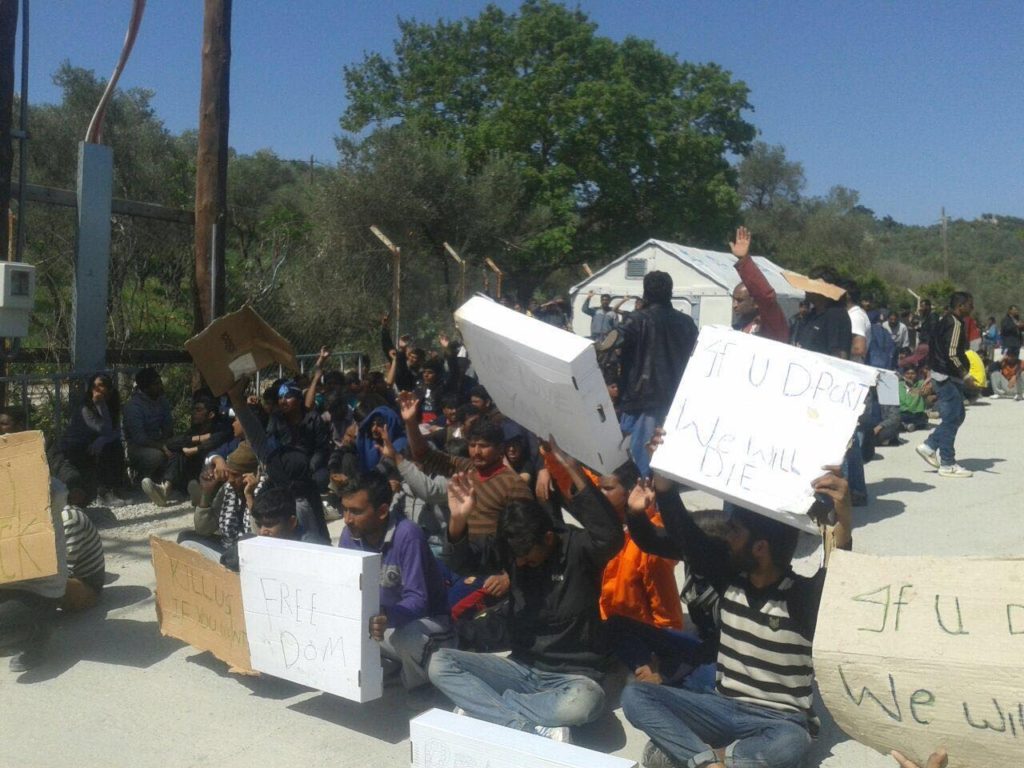
The term “refugee” speaks often and importantly to people’s own narratives of their dispossession, exile and struggle for recognition. But once the word has crossed into Europe and found its place in the vocabularies of the state and EU law, it has none of the same significance, but becomes imbricated in a structure whose object is to deny or efface those narratives and those struggles.
To the degree that the asylum procedure and the refugee category offer the most readily-available tools with which to advocate for migrants’ rights to stay, they are fundamental in exerting pressure on asylum-granting nation-states to grant protection to as many people as possible. However, given that these tools are designed to consent to the “salvation” of a minority, their endorsement should only be understood as strategic, not ideological. Confusion between the two allows for a misreading of the “refugee” category as a given, rather than a construct honed by states, overshadowing the processes by which the concept of the “refugee” pits the violence of war against the violence of poverty; it is a manufactured index for constructing a hierarchy among the desperate. In practice it also empowers states to narrow the zone of their benevolence while offsetting responsibility for the violence of the border onto the undeserving migrant. Choosing to mobilise around and insist on the value of this term “refugee” is to risk slipping into a framework of recognition whose function is to artificially reduce the number of people to whom Europe owes protection while justifying the violence inflicted on the rest. A Pakistani, my friend Sham (some of whose poems are included in this article), had a 2% chance of asylum. His appeal was rejected last month.
II.
Where the “refugee” epitomises Europe’s ability to rescue, the “economic migrant” stands as a symbol of Europe’s vulnerability– an incorrigible assailant who seems to reproduce herself after every deportation, requiring a perpetual re-enactment of the scene of defeat. But this enmity is paradoxically undercut by the fact that the “economic migrant” desires, loves (and this is the feeling of the landing) the very thing he is said to offend. In “Noise”, Sham writes,
I have fallen in love
Only to be told
Europe is already in love
What is this Europe?
Look at me!
Don’t you love Sham?
Oh God! They did not understand
Will not understand
My heart
Encourage them
If you don’t want to
Don’t give me a tongue.
It is this desire that constitutes the perils of migrant subjectivity and lays the foundations for its tragedy. For Europeans, this desire is also grounds for recognition and solidarity.
Early into the “crisis” Dimitris Christopoulos, a professor of law at the Panteion University in Athens, coined his catch phrase, “This is not a ‘refugee crisis’, it is a ‘European crisis’,” pointing to a failure in European integration that has led its constituent states to shy away from distributing the task of receiving migrants, containing them to the poorer states of the southern frontier.
This is a “European crisis” at multiple levels: the drastic increase in migrants reaching Greece in the summer of 2015 coincided with the Third Memorandum that brought an end to all hope that a government of the Left might alleviate the burden of Greek austerity. In the same month, and declaring Greece a “humanitarian crisis” zone, the European powers who had divested the border population of social and political rights through their relentless imposition of austerity descended on the border region to reinforce their claim to European territoriality. This interior colonisation bared the contradictions in notions of Europe and Europeanness that left Greeks socially and politically without, yet territorially within its confines. Golden Dawn’s defence of the Greek flag at that demonstration was not solely a mobilisation of the symbol as a statement of white supremacy over the brown; it also spoke to a recent tradition of its use as a symbol of the Greek underdog’s resistance to Northern European supremacy.
The migrant stranded at the border of Greece clamouring for the right to proceed to the north foregrounds this non-coincidence of European territory and European power that leaves the southern and eastern states in Europe yet socially dispossessed of and by it. The migrant trapped in Greece is in European territory, but knows this does not properly “count”: the real “Europe” is elsewhere, and there is a wall between. Stranded on Lesvos, Sham wrote, “Sham couldn’t find Europe/ While living in Europe.” In the non-European’s resulting alternation between enmity and desire and in her experience of perpetual disavowal are cyphered something of the experience of the southern European in the present; the migrant’s affront to Europe is given special potency because it manifests itself in a crisis not only in the EU’s relations with the external other, but in its internal social relations. The vehemence of the response of the state reflects the potential for resonance between the internal and external voices as both call for an “ideal” Europe that the crisis, and perhaps not only the crisis, has pushed beyond reach – not only of the outside, but also the inside.
Nothing
Europe, would you be mine?
Don’t ask how
The wound hurts
Pain is pain
Less or more
Stay childish
Confusion increases with age
When I’m wise
Good for me
Heart can feel
If it can speak
I cry like a mother
You have permission
To hate me, but!
You have no permission to forget me
The immigrant desires – and desires the same things that we do: a job, a home, a pension, health insurance, the benefits native Europeans were once led to reasonably expect of the welfare state and which illegalised migrants could expect to be denied. The defining feature of the current crisis is that under conditions of austerity, no one can expect them. The European worker finds herself pushed into the ranks of the precariat which were once the realm of the immigrant and suffers the violence of exploitation that accompany: unemployment, lapsed benefits, informal labour, the opportunity to obtain work only on the condition of renouncing the rights that typically came attached to it (the union, the strike etc.) Palpably, the stateless stranger has it infinitely worse than the austerity-stricken European, but what separates these two figures has more to do with the degree of their misfortune than with its nature.
With the disintegration of the welfare state as the backdrop to her class position, the precarious worker lives under perpetual threat of dispossession, of erasure, and so she is forced into trading solidarity for competition; she is a subject cast in the image of neoliberal capitalism, and designed to cater to its exigencies, floating outside structures of rights, welfare and labour now foreclosed. Under such conditions, the anxiety of integration precedes the immigrant presence, even if made to feel as if it succeeds it. The fixation on the immigrant’s brownness functions as cover for the recognition she might have occasioned: that under conditions of neoliberal capitalism none of us are integrated; for the ranks of the precariat, there is no such thing as integration.
Precarity is the solitude of the many – not just in Southern Europe, but throughout Europe. The dream of social and economic security – the European Dream – slips away, not because of immigration but because of policies of austerity. The rise of the “economic migrant” as category and problem reflects as much the thwarted dreams of the mass of Europeans as the aspirations of “outsiders”. It is part of a discourse fomented and guided towards externalization of the causes of the internal crisis. If the “economic migrants” did not exist, they would have to be invented. But, of course, they are.
In mainstream political discourse, the “refugee” is not political; she cannot be. Pictured as a distilled kernel of human suffering washed up on the shores of Europe and in need of salvation, the refugee is not after your job or your benefits or your taxes; she is only here because she could not do otherwise, and apologises for it. The refugee does not act, but has already been acted upon (has been destroyed): hollowed out of agency, desire, anger, demands, she must replace them with gratitude. It is upon condition of this hollowing-out of the political that the refugee is deemed admissible to the European embrace.
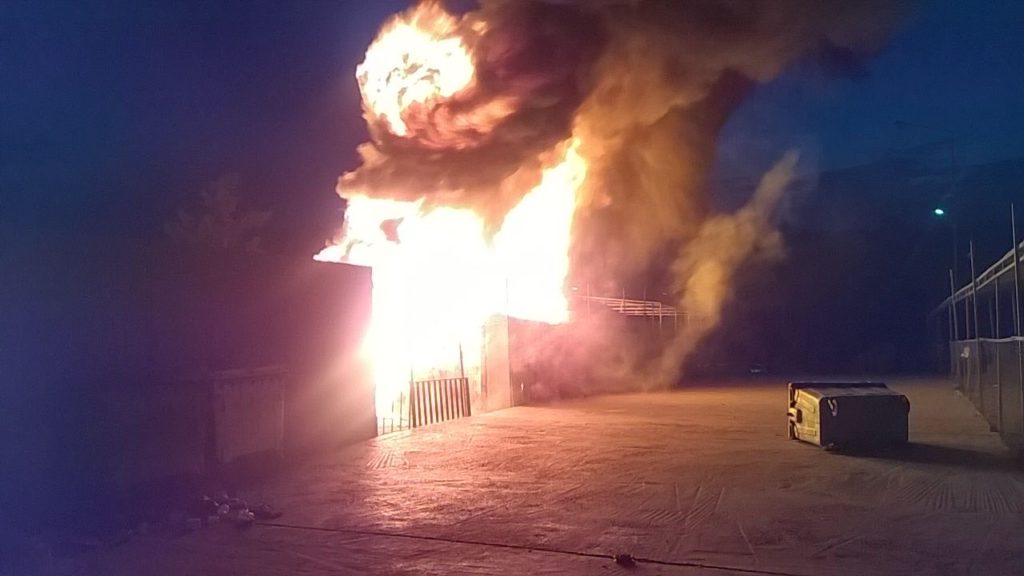
Frustrated and desperate, migrants set fire to the Moria detention center
The refugee’s negative, the “economic migrant”, is conceived as political, in ways the refugee cannot be, and it is the political plenitude of the notion of “the economic migrant” that warrants the punishment of deportation. Unlike the refugee, the immigrant is popularly posited as having elected to come to Europe. And already the notion that the immigrant has breached the border by choice means that her violation of the territorial integrity of the EU makes of her an anarchic figure posing a challenge to sovereignty and a voluntary affront addressed, in the final instance, to the state.
“They have their technologies to keep us out”, says a young man trapped in the Calais jungle in Sylvain George’s excellent documentary, May They Rest in Revolt (Figures of War). He refers to EU fingerprint monitoring. “But”, he adds, burning his fingerprints off with a glowing nail, “we have our own technologies”. The “economic immigrant” is intelligent, “sneaky”, bound in a game of elusion with the state surveillance machine. She disposes of her passport, lies about her age and her name and shaves off her fingerprints so as not to be traceable to her port of first entry. A political enmity is established. In his poem, “Refugees”, Sham writes,
The EU is a virus.
It enters the life of a refugee.
Scans his future.
Transfers him to deportation, which is
equal to death.
[…]
Send me the address of the EU.
I am a professional antivirus, full
version registered 2016.
Europe, we might think, relates to the “economic migrant” as a bitter lover seeking solace in denial; reliant on her – having been reliant on her for cheap labour since long before she even arrived – Europe has nevertheless crafted a “Fortress” to keep the immigrant out. Reliance gives rise to fears of loss of control. For her part, how does the migrant structure her romance with Europe? She wants her European Dream, but it becomes increasingly clear that to attain it she must break Europe’s rules, assault and undermine the precepts of its Union. Shorn of naivety, the embodies the necessity to smash Europe in order to stand any chance at all of enjoying the comforts Europe has long promised. How could she not terrify?
Once the European Left and Right alike saw in this ruthlessness the basis for radical political subjectivities. From the late nineteenth-century, migrants were identified as potential insurgents, the first breath of a different social order not only passively – because their very existence exemplified the breakdown of pockets of local isolation and the onset of an interconnected world – but also actively, because they frequently peopled the vanguard of various radicalisms. Identifying Europe’s destruction with the possibility of its redemption was always embodied by illegalised or otherwise unwelcome migrants. And it was always a model with relevance stretching far beyond migrants. Precarity is not substantively novel in the history of capitalism, neither is austerity, and there have long been Europeans for whom the satisfaction of their desires required the drastic reshaping of the continent’s politics.
Today, though, in a fit of liberal humanitarianism we have lost sight of old, avowedly political discourses of the migrant-as-radical at precisely the moment when the comparable vulnerability of European citizens has been rendered so clearly in Greece by the twin phenomena of Eurozone austerity and the EU’s “interior colonisation” of its periphery. The welfare structure crumbling at our feet, we vest our faith in the European structure’s endurance for a little longer, in the hope that it will look benevolently on us and make an exception. It might choose to “save us” after all. The encounter with the immigrant, to whom this hope has been violently denied, hurts. In her figure we discern the pursuit of a European Dream never truly countenanced by Europe’s elites, one that has really always been foreclosed to us as well, a Europe that punishes us even as we labour to blow on its dying embers, and whose protection might not be worth it.
***
Chloe Haralambous has spent the last year working with refugees on the Greek island of Lesvos. Poems by Shamshaid Jutt, a 20 year-old detained on Lesvos.





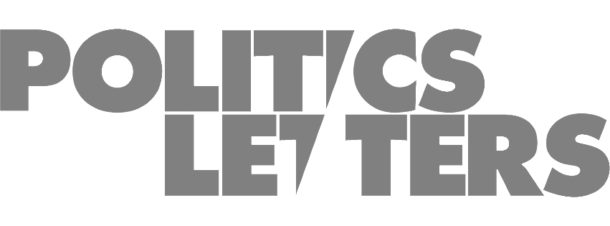
No Comments